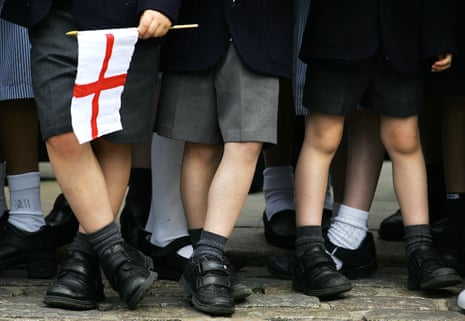Happiness does not mean being ecstatic. It is the avoidance of misery, the gaining of long-term life satisfaction, the feeling of fulfilment, of worth, of kindness, of usefulness and of love. We need new measures of what matters most to us. But in terms of education, instead of looking at ways to increase wellbeing, England has turned itself into the extremist of Europe and the effects are not going to make anyone happier.
Education in England is expanding into new extremes of elitism. The covert message is that a small elite, made up of superior individuals, should lead us. The mechanism to select such individuals is being constantly honed.
School exams are made ever more “rigorous”; university courses ever more expensive. We are heading towards our institutions in England becoming what academic and literary critic Terry Eagleton calls “service stations for neocapitalism”. The child is the customer, the student is the consumer, the teacher is a cog in the machine who needs to be constantly assessed, and everyone – child, student, teacher, institution, even every country – is to be ranked.
Universities say they want to attract the most academically able individuals – without justifying how they define “most able”. They say they wish to identify those with the most potential to excel in their chosen course of study, without explaining how they can identify potential in an admission interview or through reading the tea leaves of exam and test results. Like the clergy and conjurors of old, their academic judgments can never be questioned.

In schools, we rank institutions by the performance of the children – and the result is that schools are encouraged to exclude those least likely to do well in exams. We exclude thousands of children, especially those with special needs. In 2013-14, the number of children excluded for a fixed period from primary schools included some 6,510 with special educational needs statements and a further 30,230 with SEN but no statement. These figures do not even include those whose parents have been persuaded to withdraw their child to make it look as if they have not been excluded, or the numbers that are officially permanently excluded.
For English secondary schools, most students who are excluded for a fixed period have special needs or disabilities. In 2013-14 in England alone, 13,340 secondary-aged children with statements, and 96,750 with SEN but no statement were “fixed-period excluded”. The numbers are enormous. We simply do not know what happens to all the excluded children. Most will end up in another school or a pupil referral unit; some may be home educated. We are extreme, cruel and unusual compared with what is normal on the continent. Being ostracised is one of the most severe punishments humans inflict on each other. The fear of being sent away is profound.
Our government encourages it and apparently has no idea that in this England is highly unusual in Europe. In the rest of Europe, children are also not divided between such hugely different types of school, and few parents see the need for private education. Other European children do not go to school as early as in the UK. Nor are they tested for supposed ability at the age of four or five, when they arrive, as in England. Those tests have been shown to be extremely unreliable, and potentially harmful for children and schools. And yet ministers insist on them.
Overall spending on education in the UK per child is lower than in many other European countries, even when our extremely high rates of spending on private schools are included (not surprising when most of the elite who control national budgets do not use state education for their own children). And since 2010 huge cuts in state spending on 16-, 17- and 18-year-olds in sixth forms and further education colleges have exacerbated educational inequalities.
If dividing up children as we do, and endlessly testing them as we do were beneficial, the UK would not be languishing, as it is, at the bottom of league tables ranking the richest 25 large countries of the world. The UK is near or at the bottom for numeracy, literacy and problem-solving at age 15. We then do even worse when young adults are examined at ages up to 24.
Although there are variations around the UK, all four devolved nations test children repeatedly and use this to rank them according to “ability” or “potential”. We then send our young adults off to no work, menial work or further study. Very many go to universities with their own hierarchies of reputation and then to different kinds of jobs with huge ranges of incomes and status. Depending on how variance is measured, it is possible that no other country in the world has as great a range of university scores in international league tables as the UK does. And, since no other affluent country, apart from the US and Singapore, has as great a range of incomes for the jobs people do, it’s no wonder parents worry about how well their children are performing in school.
Carry on this way and every child will have to compete harder than the children before them, each must learn to perform better to the test, and control and constrain their imaginations more than those before them did.
If we do not seek more collective solutions to our educational problems, our schools will look more and more like exam factories. Inclusion, respect and working together are not qualities that have been in vogue in English education in recent years. And this is not making people any happier. We need to recognise that our competitive schooling system produces poor results by international standards. Becoming yet more competitive will harm us further.
And while all this is going on, we’re handing state school management to unelected and largely unaccountable trustees, as schools are turned into academies. Trustees are supposed to be drawn from this imaginary group of superior individuals, chosen to lead us, our schools and our children. Financial and other irregularities are emerging in the wake of these changes.
In Scotland, educational inequalities are currently falling, and access to university is genuinely rising. And Wales is benefiting from having none of the financial and other scandals associated with academy schools that dog England. They did well not to listen when academies were suggested there.
So how can we make things better? Education should not be about competing so hard for grades or being misled so much by adults – as children are over the terms of student loans, for example. It should be about learning, growing and enjoying studying – and in our recent past it was more like that.

A better education system would be run more collectively. A city the size of Oxford, with half a dozen state secondary schools, needs only one large senior management team, not half a dozen. Teachers could move between schools more easily so that the old and experienced didn’t so often end up where it was easier to teach and the youngest, most inexperienced teachers end up in the schools with the lowest results.
The governing body for a school should not be a small group of academy trustees responsible only to the secretary of state and an obscure regional commissioner that he or she appoints. Our current model is colonial. It is education for other people’s children. Many academy trustees will use private schools for their own children. They are trustees as some kind of act of charity where they try to “do their bit” for the lower orders.
So what could a better management model look like? How about the governing body of schools being made up of many of the school’s teachers, not just a few as in the past. A few students could also sit on it, although not for all business. A few more parents and locally elected councillors might be useful, but the bulk of the governing body should be the staff of the school, teachers, teaching assistants and someone involved in feeding the children each day too – someone who knows what they are talking about when it is suggested that lunchtime can be squeezed. Headteachers and the senior management team should be subordinate to this governing body, which contains mostly people they are line managers for.
At this point you may well think this is some kind of utopian fantasy that only an academic stuck in an ivory tower in Oxford could come up with. You would be right. Because only an academic stuck in Oxford gets to see this in action. This is how the governing bodies of Oxford colleges work. All associate professors and those with similar posts have to take part in governing the colleges they teach in. Students sit on the governing body too. It has worked for centuries, and the head of each college is subordinate to the governing body, which can sack him or her. Governance at Oxford could certainly be improved and extended to more staff; but if it works for the gown, why not the town?
Better policy options in other areas would look more often to other countries. Our children are not well served by how we organise our schools, our examinations and our society. This applies to the most supposedly privileged child, segregated at an early age from others, as much as to the rest. Without a better framework for our education system, and without reining in the extremism, most of the inequalities in English society will be perpetuated.
Danny Dorling is Halford Mackinder professor of human geography at Oxford University. His new book, A Better Politics: How Government Can Make Us Happier, will be published on 20 March
- This article was amended on 29 February 2016. The statistics about SEN exclusions in English schools relate to children who were excluded for a fixed period, not permanently, as originally stated. This has been corrected.

